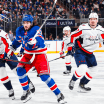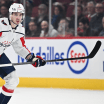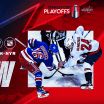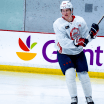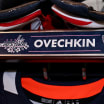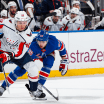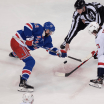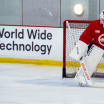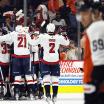POSTGAME NOTEBOOK: Canes 4, Caps 3 (OT)
Caps let Game 7 and the series slip away, all division leaders out in first round for first time in NHL history, more
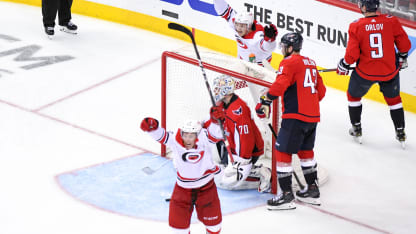
Carolina's Brock McGinn delivered the game-winner at 11:05 of double overtime in the third longest Game 7 in NHL history on Wednesday night in Washington. McGinn also saved the game for the Canes before winning it for them; he made a diving defensive play late in regulation, sweeping a puck out of the Carolina crease inches before it slid over the goal line, and squelching Washington's last and best chance to win Game 7 in regulation.
McGinn's goal completed a Carolina comeback in a game that mirrored others in the series. The Caps were good in the first period, and not as good beyond the first 20 minutes. The Hurricanes routinely outplayed the Caps over the final 40 minutes in virtually every game. Washington scored 20 goals in the series, and half of them came in the first frame. The Caps owned a 10-4 goal differential in the first period during the series, but were outscored 17-10 over the final two periods and overtime.
By the time that Game 7 overtime rolled around, the Caps were clearly running on fumes. Carolina carried the play in overtime, and only some strong stops from Braden Holtby - and a slew of defensive-zone face-off wins for Washington - kept the game going for an extra 31 minutes. Washington spent so much time chasing and defending in its own end that it rarely had the legs needed to get up ice to vie for the game-winner.
What really stings is that the Caps owned two leads in the series and twice had two-goal leads in Game 7, but they still weren't able to overcome the Canes. But they let it slip away.
"Anytime you're ahead in a series and you have an opportunity to go on the road and at the worst case scenario take one out of two on the road," says Caps coach Todd Reirden, "and we didn't bring our 'A' game in Game 3. We started to make a little bit of a push in Game 4, with Game 5 being our best, and then Game 6 - inconsistency in our game and throughout the series.
"We had some chances to put it away in this [Game 7] early, just like we had some chances to put the series away. And we weren't able to finish those plays that were ones that could decide [Wednesday's] game, or the series in Game 4 on the road for example, to give us a lead coming back home. So that's how I would describe it."
When it was all said and done, the 2018-19 Capitals weren't enough like their predecessors from the magical season before. They didn't look like the defending champs for enough of those seven games in the first round to get past a dogged and determined Carolina team that wasn't content with merely making the playoffs for the first time in a decade.
"It was obviously there to take," says Holtby. "But myself and our group, we just weren't good enough. I've got to come up with more saves to win the series, and that's pretty much the bottom line. It's not easy right now."
The Hurricanes were able to get to their game more often than were the Capitals for much more of the 450 minutes or so of playoff hockey the two teams played over the past two weeks. Washington had good starts to the series and most of the seven games, but it didn't have the killer instinct or the good health or the contributions from up and down the lineup that the 2017-18 team enjoyed and benefited from en route to the first Stanley Cup championship in franchise history.
Carolina was more consistent than the Caps throughout the series, and particularly later in games. Even when Washington went to Raleigh for Games 3 and 4 with a 2-0 series lead, there was a lingering sense that it was fool's gold because the Canes outplayed the Caps for more of those first two contests. When the Caps scored but one goal in those two games, it was a new series.
The Caps stormed the Canes in Game 5 to take a 3-2 series lead, but weren't able to assert themselves enough to administer the knockout punch at any point. They grabbed early leads in both Game 6 and 7, but their inability to add to those advantages or to maintain them leaves them at season's end.
"Every opportunity missed is devastating, really," says Caps defenseman John Carlson. "You only get to do this for so long, and you get to be fortunate to be on great teams. When you don't do well, it's more than just, 'Oh, we were up in the series or the game. It's everything. It hurts."
The Caps scored the first three goals of the series, and gave up the last three goals of the series. They owned a two-goal lead midway through the second period of Game 7 and were on the power play with a chance to make it a 3-0 lead when Carolina scored a fairly soft shorthanded goal, giving the Canes some life at a point when their own season was teetering in the wind.
"They kept coming the whole time," says Holtby of the Hurricanes. "They played a consistent style of hard work, and in the end, that's what beat us. You've got to give credit where credit is due, too. On paper, you wouldn't expect them to be the team that they are, and that's credit to them and to their coaching. They play a team game and that's why the series was so close. We just came out on the wrong end of it."
Power Outage -Washington's power play was all over the map in the series against Carolina. The Caps scored on their first two extra-man opportunities of the series in the first period of Game 1, and they scored three power-play goals in four chances in a 6-0 victory in Game 5. But aside from that, they scored only one other goal with the extra man, their lone goal in a 2-1 loss in Game 4 in Raleigh.
The Caps had a glorious opportunity to end the game with a power play early in the second overtime, while the ice quality was still relatively decent. But like so many of their power plays in the series, they seemed to lack urgency and they definitely lacked the ability to enter the zone cleanly on a consistent basis. Washington wasn't able to get a shot on goal during that double overtime power play. Just over seven minutes later, the game, the Caps' season and their bid for back-to-back Cups was over.
"We just didn't execute enough to give ourselves enough good looks, really," says Carlson. "I think we were close on a couple of plays, but that doesn't do much for you."
Washington finished the playoffs with a 25 percent success rate on its power play, scoring six times in 24 tries for the fifth best extra-man success rate of the 16 teams in the first round. But the Caps also had eight power play chances in which they weren't able to get a single puck on net, including the one that could have propelled them into the second round.
Top Heavy - Both Alex Ovechkin and Nicklas Backstrom were terrific throughout the seven-game series. One or both players had a hand in 13 of Washington's 20 goals during the series. The Caps needed more contributions from the rest of their lineup and while that started to happen late in the series, it was a bit too little and a bit too late.
Washington played the entire series without top four defenseman Michal Kempny, and top six winger T.J. Oshie missed the last three-plus games. When key players are out with injuries, it's even more imperative to get contributions from other areas of the lineup. Carolina had injuries as well, but those absences were mitigated by the fact that the Canes were getting offense from their bottom six - and from their blueline - throughout the series.
Seventh Struggles - Washington falls to 5-12 all-time in Game 7s, and it is now 2-4 in Game 7s that go to overtime. The last time - and only time - the Caps won a Game 7 in overtime on home ice was April 16, 1988 when Dale Hunter supplied the game-winner against Philadelphia.
Carolina occupies the flip side of that coin. The Canes have won five straight Game 7s dating back to the Eastern Conference final in 2006, one shy of the NHL record held by three teams.
Parity Party - For the first time in league history, the top teams in both conferences and all four division leaders went out in the first round of the playoffs. With Caps out, the league is guaranteed to have a new Cup champion for the 19th time in the last 20 years.
By The Numbers -Dmitry Orlov led the Caps with 37:57 in ice time … Carolina's Slavin led all players on both teams with 38:27 … Slavin had three assists in Game 7, and a series high nine helpers in the seven games. He is tied with San Jose's Erik Karlsson for the NHL lead in playoff assists this spring … Ovechkin and Brooks Orpik led the Caps with four shots on goal each … Ovechkin led the Caps with 10 shot attempts … Orpik and Jonas Siegenthaler led Washington with six hits each … Andre Burakovsky and Tom Wilson led the Caps with five blocked shots each … Lars Eller won nine of 13 face-offs (69 percent) and Backstrom won 21 of 33 (64 percent).


